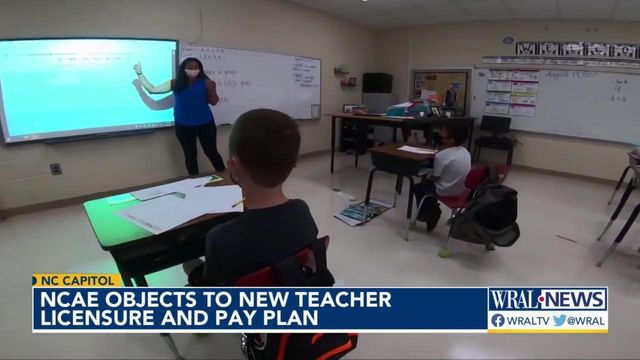NCAE clashes with proposed overhaul of teacher licensure, calls for 'necessary support and resources'
North Carolina lawmakers should reinvest in the teaching profession, not add more stress to it through a proposed overhaul of the state’s teacher licensure system, North Carolina Association of Educators members said Tuesday.
“We don't need radical reinvention of the wheel,” NCAE Vice President Bryan Proffitt said at a news conference Tuesday. "We need the support and resources necessary to do what we already know works best for our kids.”
State schools Superintendent Catherine Truitt and State Board of Education Chairman Eric Davis argue the draft licensure overhaul — which includes pay raises contingent on performance reviews — is necessary to deal with the current teacher shortage.
Teachers say the problem isn't the current licensure system, it's the lack of money spent toward helping and compensating teachers.
When Proffitt started teaching, he said, it was hard to find a job because so many teachers wanted to work here. That was before state lawmakers cut teaching assistants and did away with yearly raises for experience and cost of living. He says that’s what's behind the teacher shortage now.
The draft teacher pay and licensure plan backed by the Department of Public Instruction and other interest groups would drastically increase pay, provide more leadership roles for teachers and offer more assistance to other classroom teachers, including early-career teachers.
Last week, Davis told the State Board of Education the current licensure system “provides few supports, little assistance to developing teaching skills or expertise and no opportunity to increase compensation.”
But the draft model would also make teachers’ jobs contingent on student test scores or other measures of effectiveness not yet drawn up.
Joppa Penn works with special education students who don’t test well. She called the plan punitive. “It sends the message that we as educators are not doing enough, and that we must prove our effectiveness based upon the results of a broken measurement system,” Penn said.
The measurement system, known as the Education Value-Added Assessment System, judges students — and, eventually, their teachers — against one another, in terms of how well they perform on a standardized test against how well they were predicted to perform on the test, with some controls for demographic differences.
The system involves an algorithm that many teachers describe as opaque and not helpful for measuring success for the lowest and highest performing students, who are unlikely to easily move up a curve that flatlines on the most extreme ends.
Because the results, including those for teachers, are placed on a scale, some teachers will always fail to meet expectations. Under the licensure proposal, a teacher concerned that they wouldn't meet expectations could choose another evaluation method, but it's currently unclear what those would look like.
Only 40% of teachers are subject to the EVAAS measurement system, because only 40% of teachers teach classes with standardized tests. The licensure overhaul would provide two other ways for any teacher — including those whose students take standardized tests — to prove they are effective. Those are a qualitative growth review, yet to be fleshed out, and a set of three surveys (principal, peer and student), yet to be selected.
Megan McCauley is the parent of a son who had a hard time learning to read in English. She worries the new plan would discourage teachers from working with English language-learner students.
“When teachers are being measured by high stakes tests, a kid like my son becomes a liability, dragging their scores down year after year,”McCauley said.
Truitt, the superintendent, says the new plan will include other ways besides test scores to measure teachers’ effectiveness. But it wouldn't reward teachers for years of experience.
Proffitt says research shows that experience matters.
“We already know what will work to recruit and retain more high quality educators,” Proffitt said. “Those educators once flocked to North Carolina schools because we had working systems in place. The political leadership of our state has divested from and dismantled those systems for the last 12 years to the point to where they almost no longer exist.”
The new teacher licensing and pay system is still in the development stages, so it could change between now and fall, when the state board of education will decide whether to recommend it to state lawmakers for action next year.
DPI officials have suggested continued review of the proposed compensation amounts to make the model less expensive and more palatable to lawmakers, though starting pay for a fully licensed teacher — likely beginning within five years of starting teaching — would remain above the current maximum pay for the most experienced teachers, of $54,000.














